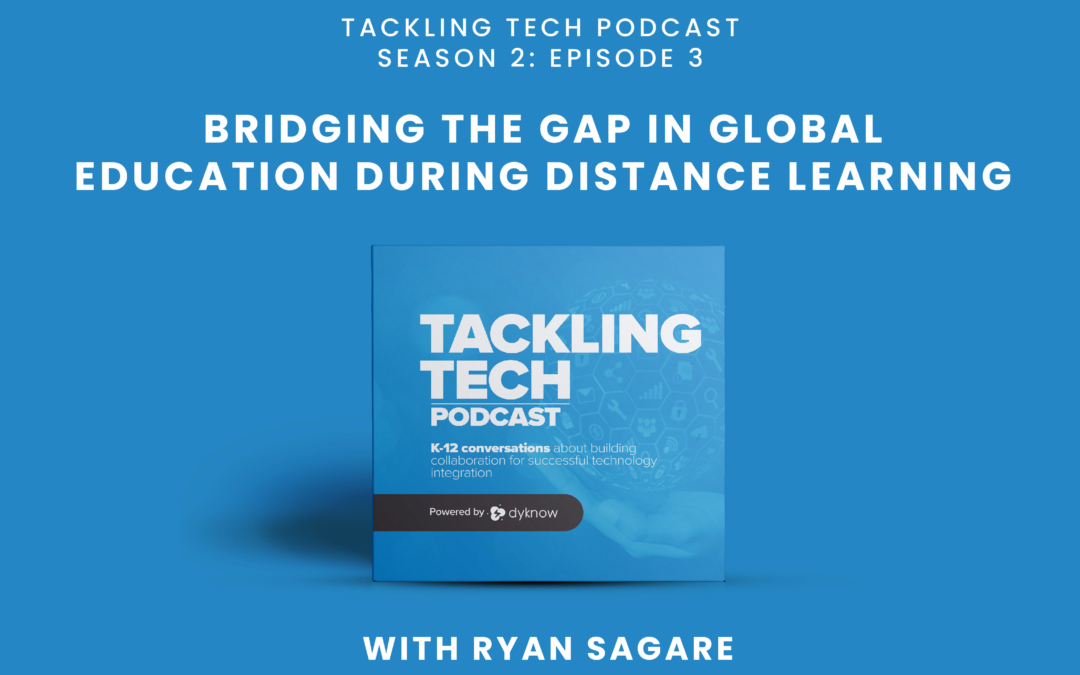On this episode of Tackling Tech, powered by DyKnow, Tierra interviews Ryan Sagare, cofounder of School Rubric, a non-profit that amplifies the voices of educators, parents, and administrators. Previously, Ryan worked abroad as an international educator and later as the Coordinator of Distanced Learning at the University of Texas. Ryan shares his gratitude for teachers, his opinion on the future of distanced learning, and some of the differences between International schools and US schools.
Listen to Episode 23:
Available wherever you listen to podcasts:
Don’t have time to listen to the episode? Here’s a peek at what’s inside…
Connecting Global Education
Global education as defined by Primary Source is, “A global education is one that incorporates learning about the cultures, geographies, histories, and current issues of all the world’s regions. It emphasizes the interconnectedness and diversity of peoples and histories.” Ryan shared a piece of his background in which he spent several years teaching abroad in countries like Columbia and Brazil. In his experience working overseas and in the U.S. Ryan explained that both domestically and internationally, there is so much learning we can do from each other.
He stated, “Every country operates differently. There are little pieces and bits you can grab from anybody that make you a better teacher and a better human being.” Every country has its own way of providing and conducting education, which provides for many learning opportunities for teachers to broaden their horizons and seek support internationally for a new perspective and new ideas. Technology provides a medium that allows our entire world to interact with each other.
“When we open up the channels of communication, we are going to learn from each other,” Ryan explained. He mentioned that in America we often focus on what is going on around us, in our country, and this is often portrayed through the media. The focus needs to shift. The importance of learning what is going on in other countries only expanded our networks, abilities, and worldview. The amount of information and conversation in the world is endless; global education provides a leeway into making connections, continuously learning about one another, and providing a robust educational experience for every student.
What is SchoolRubric?
Created by Ryan Sagare and Wallace Ting, SchoolRubric is an online educational hub that connects educators from all over the world. SchoolRubric offers blogs, articles, podcasts, magazines, professional development, panels, shows, etc. created and provided by educators in all corners of the world. Ryan was excited to announce that in 2021 SchoolRubic will begin to offer free online courses to educators everywhere.
Ryan explained that SchoolRubric started as a passion project with Wallace when they met while teaching abroad together. Their goal was to bridge two worlds of what is going on around education in the U.S. and internationally. SchoolRubric acts almost as a PLN for educators around the world allowing them to collaborate and connect on common topics within the educational verse. Ryan believes that many interesting and genius projects are being produced by educators everywhere and emphasizes how much there is to learn from all of these experts and innovators. “The connection to international teaching sets educators apart.”
How Distance Learning Affects Global Education
In a distance learning environment, the exciting part is that people can do the work on their own time. The downside is that distance learning takes away a physical interaction and a layer of connection and collaboration. With technology implementation, tools like video and online access to school resources allow taking time previously used in the classroom a way to provide for more application, collaboration, discussion, and connection in the physical classroom. Global education allows the continuation of meaningful interaction and conversation by enticing students to seek out learning opportunities and create conversations in which they can expand and grow from. Ryan hopes for a future where the teacher doesn’t stand in front of the classroom to lecture, rather the teacher spends time creating interactions, discussion, and collaboration opportunities to protome connecting with one another and learning about new perspectives.





